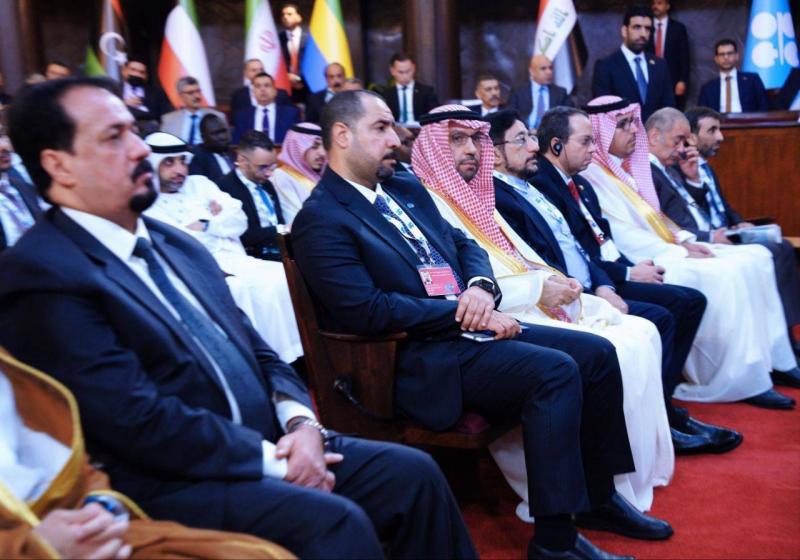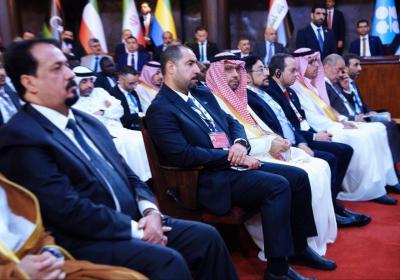Today, Friday, a celebration marking the founding anniversary of the OPEC organization took place in the Iraqi capital, Baghdad, with international participation. During this event, Iraqi Prime Minister Mohammed Shiaa Al-Sudani emphasized that alternative energy will compete with oil and gas in the future. Al-Sudani welcomed the attending guests, including oil ministers from member countries, recalling the founding members who gathered in this hall 63 years ago to establish OPEC, which has become one of the most important international organizations today.
During the celebration, Al-Sudani stated, "Oil remains a primary source of energy in the world, holding significance in politics, economics, development, and the environment. It is also vital for countries that depend on it, whether in production or consumption." He added, "When OPEC was established, the oil wealth was managed by monopolistic companies that deprived countries of their sovereignty and influence in the oil market."
He further noted that "OPEC members manage their oil plans, production, and industry with full sovereignty and set their oil policies," indicating that "the organization's responsibility does not end at export limits but extends to market regulation and price stabilization, aiming for a fair price for producers and consumers."
Al-Sudani continued, stating that "the entry of natural gas and associated gas into the energy investment market has added new responsibilities for member countries, as gas has become a vital resource for many industries, prompting member states to address the multiple challenges they face."
He clarified that "the government has focused since its formation on the energy file in all its details, particularly concerning oil and associated natural gas," adding, "Iraq has relied for many years on oil as a primary source for the economy and finance, while associated natural gas has been neglected, causing us to miss many development opportunities, as well as the environmental impacts accompanying the oil industry."
He continued, "We have begun processes to develop the oil industry and invest in what has been neglected, and we have signed significant contracts for the investment of both natural and associated gas. Soon, the sixth round will be signed to target important areas for natural gas fields."
He announced that "we have collaborated with major companies in the energy sector, including the recent agreement with Total Energy to achieve integration in energy investment and make Iraq an active player in the gas market in the coming years," asserting that "investment in gas will end the waste of gas resources that cost Iraq nearly $4 billion annually."
He pointed out, "We have prioritized allowing the private sector and global companies to have a role, providing them with facilities." He concluded by saying that "the world today is seeking alternatives to traditional energy and is moving towards alternative energy sources, which will compete with oil and gas in just a few years, and we must prepare now and plan to keep pace with global transitions toward energy alternatives."
Additionally, Iraqi Minister of Oil Hayan Abdul Ghani welcomed attendees at the OPEC founding anniversary celebration in Baghdad, stating, "Baghdad welcomes your presence after six decades." He added, "We will sign a memorandum to declare the founding of OPEC in Baghdad in celebration of 63 years." Abdul Ghani mentioned during the celebration that "we strive to use modern technology in the oil sector and have progressed according to a roadmap to elevate the Iraqi economy with support from the Council of Ministers," noting that "OPEC seeks to achieve oil stability and there is cooperation and coordination among OPEC countries for mutual interests."
In the same context, Saudi Energy Minister Prince Abdulaziz bin Salman thanked Iraq for its warm welcome, explaining that "OPEC played an effective role in establishing the OPEC Fund for International Development." He added that "OPEC has achieved its goals and OPEC+ has maintained stability in energy markets."
Meanwhile, Kuwaiti Oil Minister Manaf Al-Hajeri thanked Iraq for hosting the OPEC founding anniversary celebration and praised the welcoming atmosphere, stating that "OPEC represents an important pillar in the global energy community." He added that "OPEC reaffirms its commitment to stabilizing global markets and works with ten non-member countries for oil stability."
The head of the Iranian delegation, Amir Hossein Zamanian, mentioned, "We are present today at this historic conference, which marks the founding anniversary of OPEC in Baghdad," thanking Prime Minister Mohammed Shiaa Al-Sudani for hosting the OPEC founding anniversary celebration in Baghdad and stating that "OPEC has a positive impact on the oil market."
OPEC Secretary-General Haitham Al-Ghais announced during the celebration that the organization will continue its role in maintaining oil price stability in global markets. Al-Ghais stated, "The historic agreement has contributed to preserving the sovereign rights of the five member countries, especially in the oil sector," adding, "Currently, the organization's membership consists of 13 oil-producing countries that operate on the same principles and noble ideals upon which the organization was founded."
Al-Ghais reiterated that the organization "will continue to play its pivotal role in maintaining oil price stability in global markets."
Recently, the Ministry of Oil announced that "the capital Baghdad will host the 60th anniversary celebration of the Organization of the Petroleum Exporting Countries (OPEC) at the People's Hall, which witnessed on September 14, 1960, the signing by five oil-producing and exporting countries: Iraq, Saudi Arabia, Iran, Kuwait, and Venezuela to declare the independence of decision-making in managing oil resources and breaking the monopoly of foreign companies."
It is worth noting that OPEC is an international organization that was established at the historic Baghdad conference held from September 10 to 14, 1960, attended by oil ministers from Iran, Iraq, Kuwait, Saudi Arabia, and Venezuela. The organization has since grown to include 13 oil-producing countries today.




